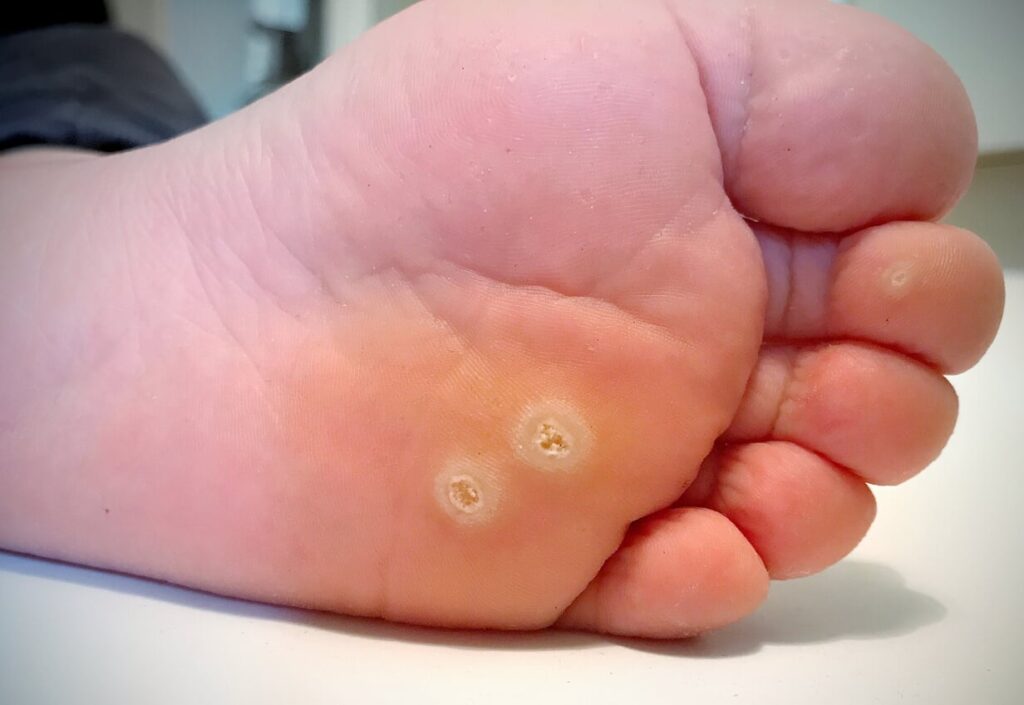plantar wart treatment | plantar wart doctor | medication for plantar warts in Plano, Frisco, Allen, Mckinney, Carrolton, TX
A plantar wart is a hard, grainy growth that usually appears on the bottom of the foot where the most pressure is absorbed. Plantar warts result when the human papillomavirus (HPV) enters the body through small cuts or wounds on the soles of the feet. Warts may spread with treatment but often go away on their own over time. Warts that continue to spread or because pain need treatment as soon as possible.
Plantar warts are the small growth beneath the skin which is caused by human papillomavirus.

SYMPTOMS OF PLANTAR WARTS:
Plantar warts can be very painful. One of the principal side effects, you may see is pain or tenderness when squeezing your foot while walking, standing or running.
When the wart has shaped, you’ll see a roundabout level spot on the skin with a depressed region in the center. The wart may seem yellowed, with a crust, or even have a dark spot in the center.
DIAGNOSIS:
If you feel you have a plantar wart, you should check in with your podiatric physician. It tends to be difficult to tell how much the wart has developed underneath the skin. You should see your podiatrist if the wart is causing you pain or spreading to another area.
Your doctor can assist you with figuring out which treatment is best for you dependent on how deep the wart is. In the event that the wart is recurrent, for instance, your podiatric physician may pick an alternate treatment to guarantee its removal.
Most of the time your podiatrist diagnoses plantar warts with one of these techniques.
- He examines lesion.
- Checking for signs of dark and pinpoint dots. (Tiny blood vessel clots).
- They remove a small section of lesion and send that to a laboratory.
PLANTAR WARTS TREATMENT:
Now and again, a plantar wart will resolve normally. Different cases may require treatment. You can treat a plantar wart a couple of various ways, either by seeing your podiatric physician or treating the wart at home. Medicines include:
- A salicylic acid cream skin cream that can “burn” off the wart.
- Fluid nitrogen, which can be utilized to “freeze” of the wart.
- Curettage, which includes removing the wart.
- Medication applied to the wart.
Home remedies are often ineffective at treating warts, causing them to spread to other areas of the foot. Effective treatment is needed to permanently eliminate them and help reduce the risk of warts spreading.
Most plantar warts are harmless and disappear without treatment, however, it might take a year or two. In the event that your warts are painful or spreading, you might need to have a go at treating them with over-the-counter (nonprescription) drugs or home cures. You may require many repeated medicines before warts disappear, and they may return later.
On the off chance that your self-care approaches haven’t helped, talk with your podiatric physician about these medicines
STRONGER PEELING MEDICINE (SALICYLIC ACID).
Prescription-strength wart meds with salicylic acid work by eliminating layers of a wart a little bit at a time. They may also stimulate your immune system’s capacity to fight the wart.
Your doctor will probably suggest you apply the medication consistently at home, followed by occasional office visits.
FREEZING MEDICINE (CRYOTHERAPY):
Cryotherapy done at a doctor’s office includes applying fluid nitrogen to the wart, either with a spray or a swab. This technique can be painful, so your podiatric physician may numb the region first.
There is also a chemical that can be applied in the office that can form a blister around your wart in order to remove it that is done in conjunction with cryotherapy. You may also need to re-visit the specialist’s office for repeat treatments until the wart vanishes.
PLANTAR WART TREATMENT IN PLANO, TX
If you want to see a doctor in Plano for plantar warts or for any other foot problems, you can visit Dr. Zubeen Mistry. He is specialized in foot problems and can treat your plantar warts with different new techniques. DFW Foot and Ankle Care offers several treatment options for plantar warts, using the most advanced techniques available. Dr. Zubeen Mistry works with patients to develop a plan of action that meets the patient’s individual needs. To learn more about treatment options for plantar warts or schedule an appointment, contact our office at (469) 551-8595
At DFW Foot Ankle Care, we treat Bunions and Hammertoes, Diabetic Foot Care, Fungal Nails, Heel Pain / Plantar Fasciitis, Ingrown Toenails, Minimally Invasive Surgery, Neuroma, Pediatric Foot Problems, Plantar Wart, Running Injuries and many more foot problems.
Same Day & Late appointments are available at DFW Foot and Ankle Care. Please call us for availability

